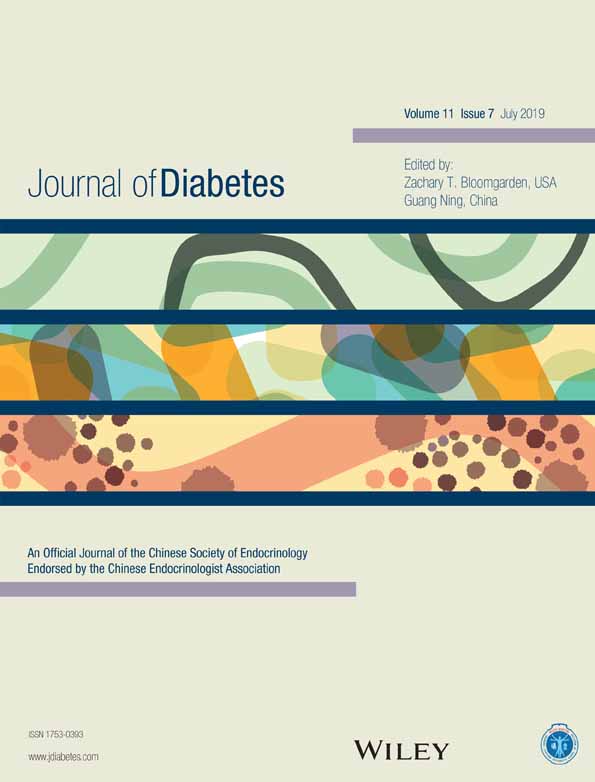Role of metabolic syndrome and its components as mediators of the genetic effect on type 2 diabetes: A family-based study in China
代谢综合征及其组分在2型糖尿病遗传效应中的介导作用:基于中国人群的家系队列研究
Abstract
enBackground
Metabolic syndrome (MetS) share a genetic basis with type 2 diabetes (T2D). However, whether MetS and its components mediate genetic susceptibility to T2D is not completely understood.
Methods
We assessed the effects of MetS and its components on associations T2D and 18 genome-wide association studies-identified variants using a two-stage strategy based on parametric models involving 7110 Chinese participants (2436 were T2D patients) across 2885 families. Multilevel logistic regression was used to account for the intrafamilial correlation.
Results
Metabolic syndrome significantly mediated the effect of a melatonin receptor 1B (MTNR1B) polymorphism on T2D risk (OR of average causal mediation effect [ORACME] 1.004; 95% confidence interval [CI] 1.001-1.008; P = 0.018). In addition, low high-density lipoprotein cholesterol (HDL-C) levels mediated the genetic effects of MTNR1B (ORACME 1.012; 95% CI 1.007-1.015; P < 0.001), solute carrier family 30 member 8 (SLC30A8; ORACME 1.001; 95% CI 1.000-1.007; P < 0.040), B-cell lymphoma/leukemia 11A (BCL11A; ORACME 1.009; 95% CI 1.007-1.016; P < 0.001), prospero homeobox 1 (PROX1; ORACME 1.005; 95% CI 1.003-1.011; P < 0.001) and a disintegrin and metallopeptidase with thrombospondin type 1 motif 9 (ADAMTS9; ORACME 1.006; 95% CI 1.001-1.009; P = 0.022), whereas increased fasting blood glucose (FBG) significantly mediated the genetic effect of BCL11A (ORACME 1.017; 95% CI 1.003-1.021; P = 0.012).
Conclusions
This study provides evidence that MetS and two of its components (HDL-C, FBG) may be involved in mediating the genetic predisposition to T2D, which emphasize the importance of maintaining normal HDL-C and FBG levels.
摘要
zh背景
代谢综合征与2型糖尿病在某些遗传背景方面具有相似性,但代谢综合征及其组分是否参与调节2型糖尿病的遗传易感性目前尚不完全清楚。
方法
本研究对代谢综合征及其组分在18个全基因组关联研究提示阳性基因位点与2型糖尿病的关联中所起的作用进行了两阶段基于参数模型的分析。研究共纳入7110名中国人群研究对象(其中2436名为2型糖尿病患者),分布在2885个家系中。研究采用多水平logistic回归模型对家系成员间的相关性进行调整。
结果
本研究发现代谢综合征在MTNR1B基因位点与2型糖尿病风险的关联中具有显著的调节作用(平均因果介导效应ORACME1.004;95% CI:1.001-1.008;P = 0.018)。另外,低水平的高密度脂蛋白胆固醇在MTNR1B基因位点(ORACME 1.012;95% CI 1.007-1.015;P < 0.001)、SLC30A8基因位点(ORACME 1.001;95% CI 1.000-1.007;P < 0.040)、BCL11A基因位点(ORACME 1.009;95% CI 1.007-1.016;P < 0.001)、PROX1基因位点(ORACME1.005;95% CI 1.003-1.011;P < 0.001)以及ADAMTS9基因位点(ORACME1.006;95% CI 1.001-1.009;P = 0.022)与2型糖尿病风险关联中具有统计学介导效应。而空腹血糖增加可能参与调节BCL11A基因位点对2型糖尿病风险的遗传效应(ORACME1.017;1.003-1.021;P = 0.012)。
结论
本研究为代谢综合征及其两个组分(高密度脂蛋白胆固醇和空腹血糖水平)可能参与介导2型糖尿病的遗传易感性提供了证据,提示高密度脂蛋白胆固醇水平和空腹血糖水平的控制对于2型糖尿病遗传易感人群的疾病预防具有重要意义。
CONFLICTS OF INTEREST
None declared.




